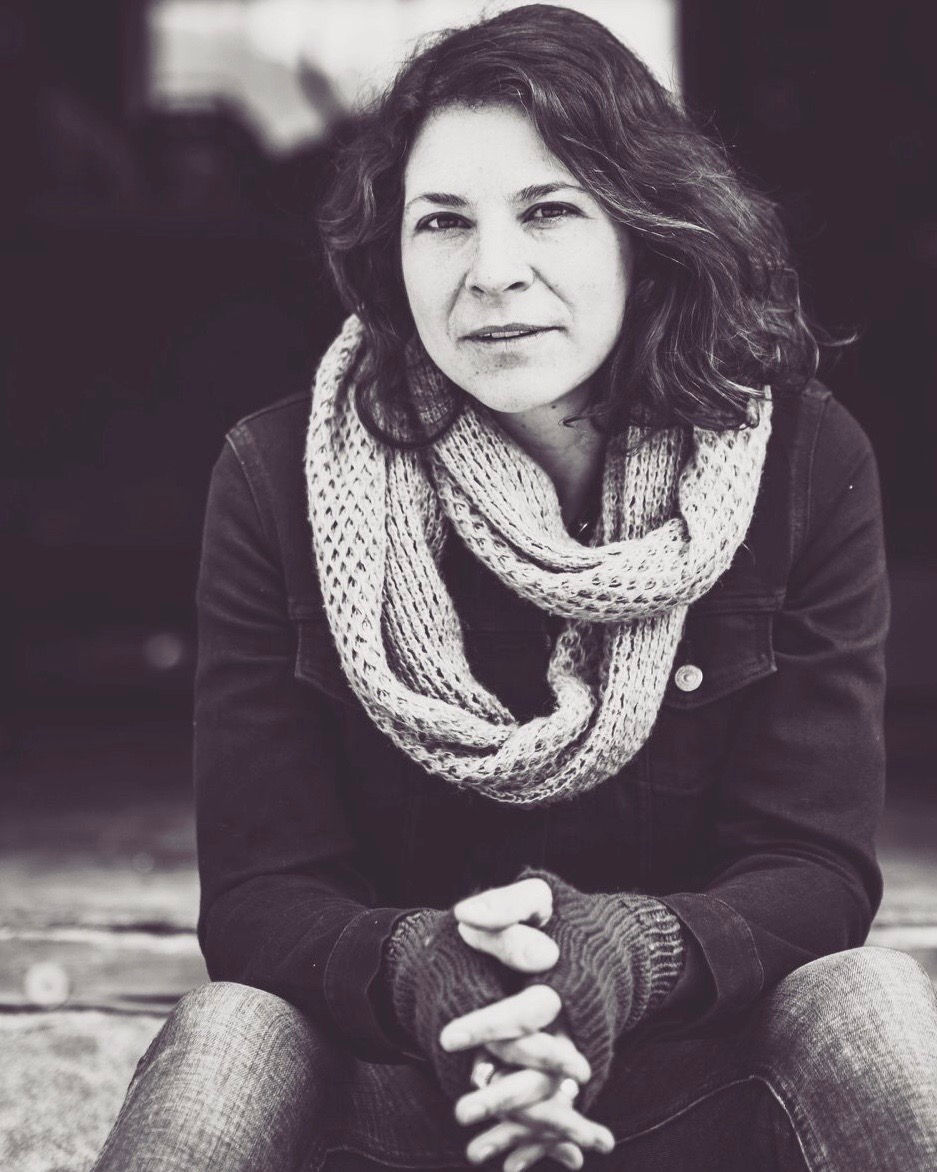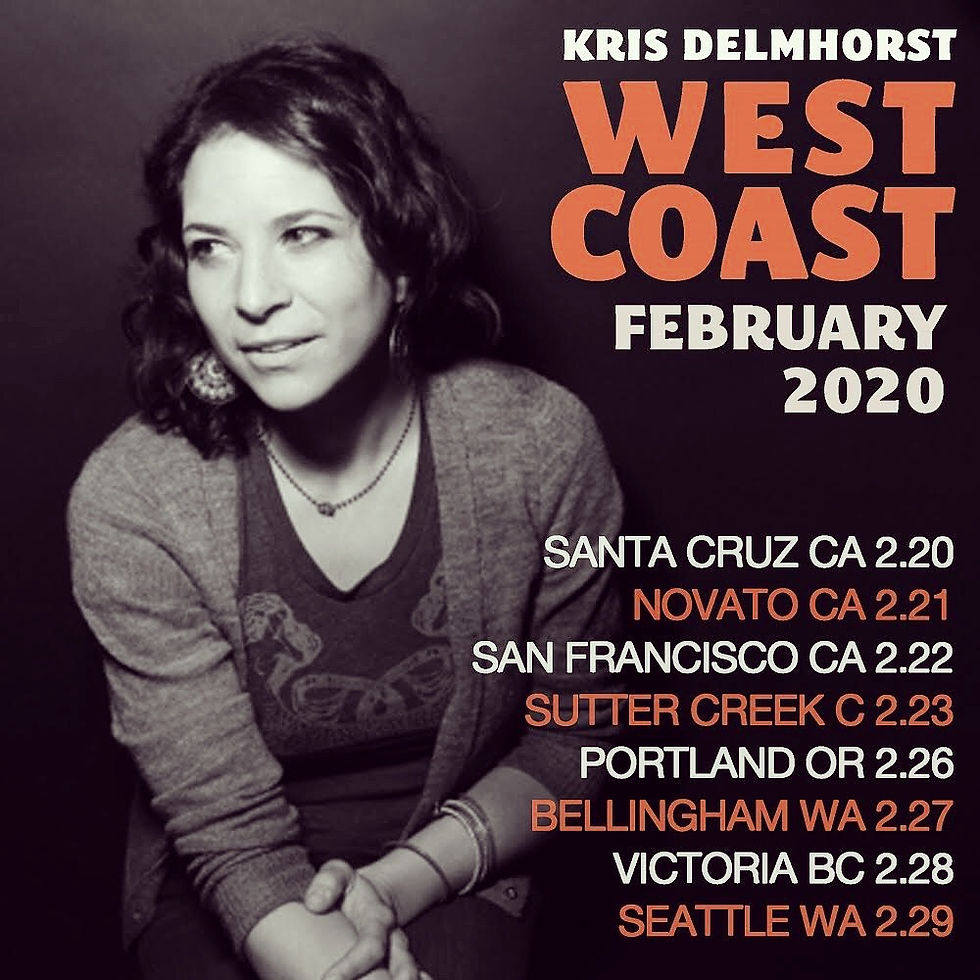Beautiful Conversation: Checking in with Kris Delmhorst
- emiliesmustsees
- Feb 4, 2020
- 5 min read
Updated: Feb 7, 2020

Kris talks marriage, melodies, and the mosaic of the music scene.
(Tickets for the HopMonk Tavern Novato show on Friday, Feb 21 are available here: kcturnerpresents.com)
By Emilie Rohrbach
ER: Hi Kris! Well, I have to say, it is a sheer joy to have the opportunity to interview you. I went to college in Boston in the late 1990s, and I listened to your first album, Appetite, incessantly - I think I actually had it on cassette tape! "Weatherman" was my go-to battle cry song as I navigated the treacherous waters of romance. Did you think back then you'd be here now, still making music and touring the world as a musician? Is there a way to capture what the adventure has been like?
KD: Oh, that's so sweet to hear. That goes way back! In all honesty I would have been absolutely floored to know that my life would end up unfolding as it has. I never really had the goal of making my living as a songwriter, at least not that I had articulated to myself. I don't think I was spending a whole lot of time analyzing any of it, but if you'd asked me then I guess I would have said I was just messing around with music while I waited to figure out what I was actually gonna do when I grew up.
ER: In the 90's, the singer-songwriter scene was thriving, especially in cities like Boston and Austin, Texas. How has the landscape changed over the years, especially for this type of music? Is it true that if you want to be taken seriously now as a musician, no matter what genre, Nashville is the place to be?
KD: There is always somewhere that they say you have to move if you want to make it as a musician, and it is absolutely never true. That said, Nashville is certainly the place they say that about at this particular moment. When I was starting out, Nashville was not super relevant unless you were working in mainstream country. It's great to see how much broader that town's ears have gotten, to the point that half the people I know have migrated there, and lots of exciting music is being made, a lot of which has very little to do with the country scene at all. I love to spend time there, it reminds me of my early days in Boston - the amount of musical activity, the special energy that comes with an entire community of people being excited about songs together, the crosspollination and collaboration among players and bands. All of those things are the reasons it's really great to live in a thriving music scene, especially when you're starting out. They're also the things that eventually make a town overspill its carrying capacity, until it gets crowded and expensive enough that no actual musicians can afford to live there. After that, there will be a new place they'll say you have to move to make it, and that won't be true either, but the people there will probably have a really sweet situation to live and work in for a while.
ER: When I moved to San Francisco from Boston, I was told the only place to see singer-songwriter music was Freight and Salvage in Berkeley. This type of music seems to have been revitalized in the Bay Area, thanks in part to a thriving house concert scene. Do you have a preference between house concerts or larger stages?
KD: I think house concerts provide a really important piece of the live-music mosaic, especially these days as many clubs are closing and it's harder for most touring artists to fill rooms due to the various at-home entertainment options people have, I guess. Some house concert shows have been among my favorite moments, but generally I still prefer clubs. For one thing, it's more fun for me to sing into a mic, because I'm a quiet singer and I can be more varied in my use of my voice if I have amplification to work with. And I rarely play solo, so that makes it all the more important to have amplification. But also I often like the overall experience of a club show better; the separation between audience and performer is relaxing for everyone, I think, and I like it being a public space, and I care very much about the room being dark so that people can forget themselves and be in the music, and most house concerts have pretty ad hoc lighting - which has its own charms of course. There's a directness to house shows that is pretty special too and can be real magic, in the right circumstances.
ER: Part of your creative journey over the years has included collaboration with your also well-renowned musician husband, Jeffrey Foucault. You sing together in the band Redbird (with Peter Mulvey, another amazing artist) and I believe he also co-produced your last album, The Wild, released in 2017. How did you meet, and what's it like creating music with your partner?
KD: We met on a UK tour in 2003, and yes we've had various shared projects over the years, including The Wild. It's really comfortable and homey to be on stage or on the road together when we can make that happen, but I think the most important things we give each other as artists are, number one, respect for space and privacy around each other's work, and number two, offering informed, compassionate, constructive criticism and feedback when the time comes for that. We are completely separate artists, but closest allies, and I know that having each other as first listeners has helped both of us grow and thrive as writers.

ER: And you and Jeffrey also have a daughter together? How do you guys balance music and family?
KD: Yes, she's eleven. This is the hardest piece of the whole thing, because we both need to tour, but we need to have enough time all together at home to make some semblance of a regular life too. Booking and scheduling is pretty torturous, in fact it's one of my absolute least favorite parts of my life. That said, it's nice to show our kid what working hard for what you love looks like. For The Wild we got to tour together with our band family and our daughter, eight or nine of us in a van wandering around the country, and although we couldn't afford to do that all the time (financially or creatively) it was incredibly fun, and a rare opportunity for us both to be on the road without desperately missing anyone! And pretty informative for her too, I think. So I'm sure we'll keep doing that occasionally until the time comes that she's not willing to be seen in public with us.
ER: One of my favorite albums of yours is "Strange Conversation." Released in 2006, this album was an experiment in music and poetry. Can you tell us more about the inspiration for this project?
KD: It was like a creative vacation, because I got to start with piles and piles of great language - the absolute opposite of starting with an empty page. I allowed myself freedom to just play, not to be precious with the poems but shake them up and chop them and twist them, and the whole thing was a rejuvenating and joyful process. I still love that record and those songs very much.
ER: I believe you have a new album coming out soon - what's next on the horizon?
KD: I do! I will have a new record out in the fall. I'm in the final stages of mixing it now. I recorded it live with a 9-person band in Maine this past November. It's too soon to say much of anything about it yet, but it's a record I feel very strongly connected to and I absolutely can't wait ‘til it's ready to share!

The show you'll want to come to is at HopMonk Tavern Novato on Friday Feb 21! Details here: kcturnerpresents.com



Such good questions Emily. Love it.